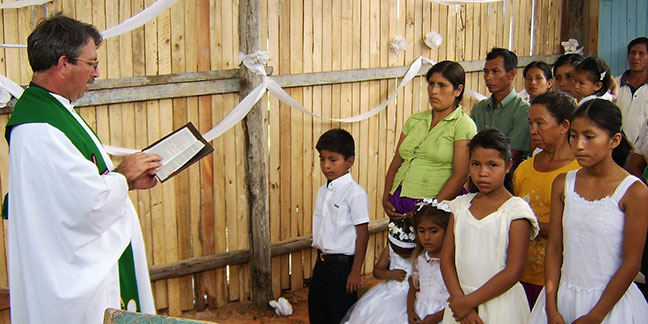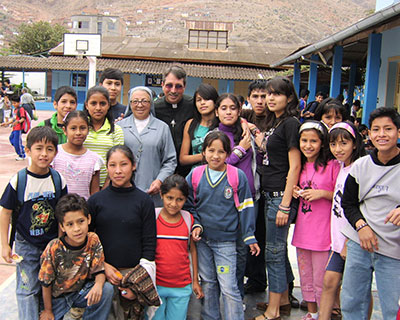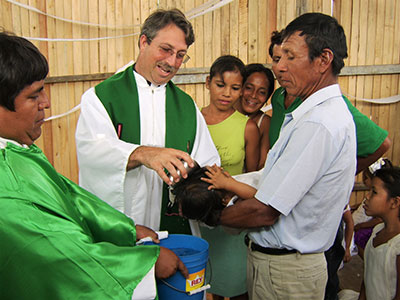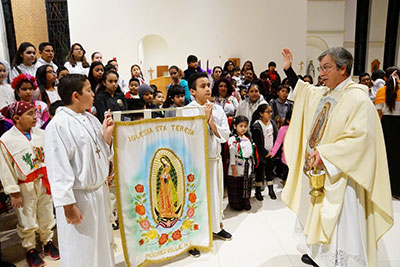‘Trips to Latin America, Hispanic pastoral ministry have greatly enriched my life and priestly ministry’
 CHARLOTTE — Sometimes I am asked how I came to speak Spanish. In truth, I am still learning, but I smile as I reflect on this journey that dates back more than 30 years.
CHARLOTTE — Sometimes I am asked how I came to speak Spanish. In truth, I am still learning, but I smile as I reflect on this journey that dates back more than 30 years.
In high school, I was told I needed to study a foreign language to be accepted into college. I didn’t know what to take. Some of my classmates had taken Latin and had received poor grades, so I decided against that one. I settled on Spanish, which I took for two years. In those days, the emphasis was not on conversational Spanish, but it was a basic start. I certainly never imagined then in the 1970s that Spanish would become my second language.
A few specific experiences helped shape my outlook on Spanish during my formation to the priesthood. On a mission trip to the Deep South, I was part of a small group assisting a priest to offer Mass in a barn for some migrant workers. Thirty Hispanic men lived in this barn in Arkansas, surviving in very humble conditions while working on the farms in the area. That was my first experience ministering to migrants.
Another time, I went to a hospital in Charlotte to bring Holy Communion to a parishioner following her surgery. In the hallway, a woman approached and asked me, “Are you a priest?” I replied that I was a seminarian. She asked me if I would visit her father, who was a patient there, and bring him Holy Communion. When we entered the room, she told me, “We are from Bolivia and he only speaks Spanish.” We had a Communion service and she translated what I said into Spanish for him. I thought to myself, “I should learn how to communicate in Spanish for my future priestly ministry.”
Another time while I was in the North Carolina mountains, heading to the church in Spruce Pine. I stopped for gas and noticed six Hispanic men standing alongside the road, apparently waiting for a ride. I knew that many Hispanics work for Christmas tree growers in that area. I thought to myself, “This is a rural area. I would like to go over and speak to those men, but I don’t speak Spanish.”
So while I was still in the seminary, I made the decision to learn Spanish. I took two classes in general Spanish and then two in “Pastoral Spanish.” After my ordination in 1995, I thought I would have a year or two to work my way into Hispanic Ministry. My first pastor, Father Thomas Walsh, told me upon my arrival at Holy Family Parish in Clemmons, “Well, Mark, you have responsibility for the ministry here and you are also the chaplain to our youth group and to the Hispanic Community of Cristo Rey in Yadkinville.” So rather than having a year or two, I had the opportunity to jump right in.
The families at Cristo Rey were very kind and patient with me as I tried ministering to them in Spanish. After a few months, I recognized my limitations, particularly with confessions, homilies and pastoral counsel, so Bishop William Curlin gave me permission to participate in a month-long language school in Mexico. That immersion was a great experience for me. I lived with a family in Cuernavaca, Mexico, attended classes and helped in a local parish. I also visited cathedrals, convents, shrines and historical sites. That immersion opened my ears to the language and helped me to understand and communicate better.
 Over the past 25 years since then, I have been involved in Hispanic ministry at each of my parish assignments. After Clemmons, I served in Winston-Salem, Biscoe, Jefferson, Sparta, Charlotte, and now in Mooresville. I have celebrated more than 1,500 Masses in Spanish and have probably baptized approximately 2,000 people in Spanish. There have also many celebrations of the feast Our Lady of Guadalupe, house blessings, quinceañeras, weddings and family fiestas.
Over the past 25 years since then, I have been involved in Hispanic ministry at each of my parish assignments. After Clemmons, I served in Winston-Salem, Biscoe, Jefferson, Sparta, Charlotte, and now in Mooresville. I have celebrated more than 1,500 Masses in Spanish and have probably baptized approximately 2,000 people in Spanish. There have also many celebrations of the feast Our Lady of Guadalupe, house blessings, quinceañeras, weddings and family fiestas.
My various trips to Latin America and Hispanic pastoral ministry here in the Charlotte diocese have greatly enriched my life and priestly ministry. As a pastor and as a seminarian supervisor, I have always encouraged parochial vicars and seminarians to spend some time learning the Spanish language and the rich Hispanic culture in order to better serve our Hispanic Catholics.
Over the years, I have become convinced that Hispanic ministry is well worth the effort. Participation at events such as the annual Eucharistic Congress demonstrate the tremendous energy and faith of the many Hispanics in our midst.
For me, the journey has been a joyful one.
— Father Mark Lawlor, Special to the Catholic News Herald. Father Mark Lawlor is pastor of St. Therese Church in Mooresville.

Pictured: Just after his ordination in 1995, Father Mark Lawlor started to work for the Hispanic Ministry at Holy Family Parish in Clemmons and Christ the King in Yadkinville.Father Mark celebrates a baptism in a humble chapel in the jungle of Peru; appears with participants of a Salesian youth program in Huánuco, Peru; and blesses those attending the feast of Our Lady of Guadalupe celebration at St. Therese Church in Mooresville. (Photos provided by Father Mark Lawlor)


